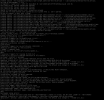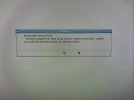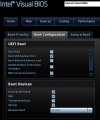hi Guys
I have a problem with the installation of Proxmox v7.0.1 in UEFI mode on a Dell R320 server with ext4 file system
Storage:
Dell Perc H710 mini (Original Firmware) (non-IT-Mode) 2xSSD 250GB Samsung Pro RAID-1 (Element Size 256Kb, Read Policy Adaptive, Write Policy write through)
I have test wise times Win Server 2016 installed in uefi mode under ntfs no problems
I also tested it with debian v10 the same error.
As soon as the installation is finished and tries to write the bootloader, this error occurred (Failed to Prepare UEFI Boot)
I know I could flash the H710 mini in IT mode and use ZFS-RAID-1 but I don't want to because of the performance and the massive RAM consumption.
I know that Proxmox v7.0.1 now also supports btrfs and know the theoretical advantages. But I don't know what the performance and data security looks like, e.g. data recovery in case something really goes wrong.
I have a couple of H710 mini controllers at home and could also replace them should it break.
That is why I thought about using hardware RAID-1 without cach functions. (If the power fails for a longer period of time) (UPS is available and H710 mini is equipped with a battery).
ext4 shouldn't have any problems with a RAID volume. I'm not so sure about the LVM volume anymore.
But now it fails because of the installation of the bootloader. (grub, efi)
Do you have any suggestions as to how I should install a fail-safe and high-performance system or what could be causing the error.
Log attached.
Thanks in advance for your answers.
Sorry if anything is wrong first post
German English no problem
I have a problem with the installation of Proxmox v7.0.1 in UEFI mode on a Dell R320 server with ext4 file system
Storage:
Dell Perc H710 mini (Original Firmware) (non-IT-Mode) 2xSSD 250GB Samsung Pro RAID-1 (Element Size 256Kb, Read Policy Adaptive, Write Policy write through)
I have test wise times Win Server 2016 installed in uefi mode under ntfs no problems
I also tested it with debian v10 the same error.
As soon as the installation is finished and tries to write the bootloader, this error occurred (Failed to Prepare UEFI Boot)
I know I could flash the H710 mini in IT mode and use ZFS-RAID-1 but I don't want to because of the performance and the massive RAM consumption.
I know that Proxmox v7.0.1 now also supports btrfs and know the theoretical advantages. But I don't know what the performance and data security looks like, e.g. data recovery in case something really goes wrong.
I have a couple of H710 mini controllers at home and could also replace them should it break.
That is why I thought about using hardware RAID-1 without cach functions. (If the power fails for a longer period of time) (UPS is available and H710 mini is equipped with a battery).
ext4 shouldn't have any problems with a RAID volume. I'm not so sure about the LVM volume anymore.
But now it fails because of the installation of the bootloader. (grub, efi)
Do you have any suggestions as to how I should install a fail-safe and high-performance system or what could be causing the error.
Log attached.
Thanks in advance for your answers.
Sorry if anything is wrong first post
German English no problem





